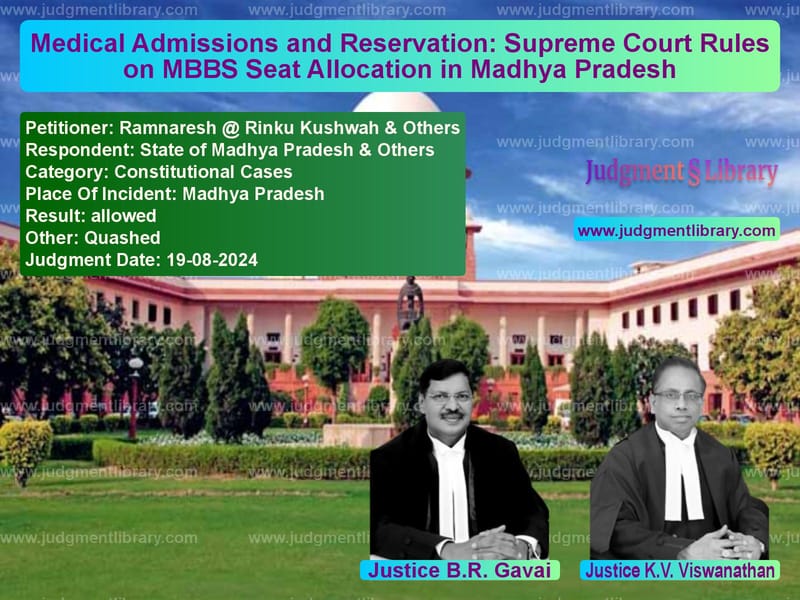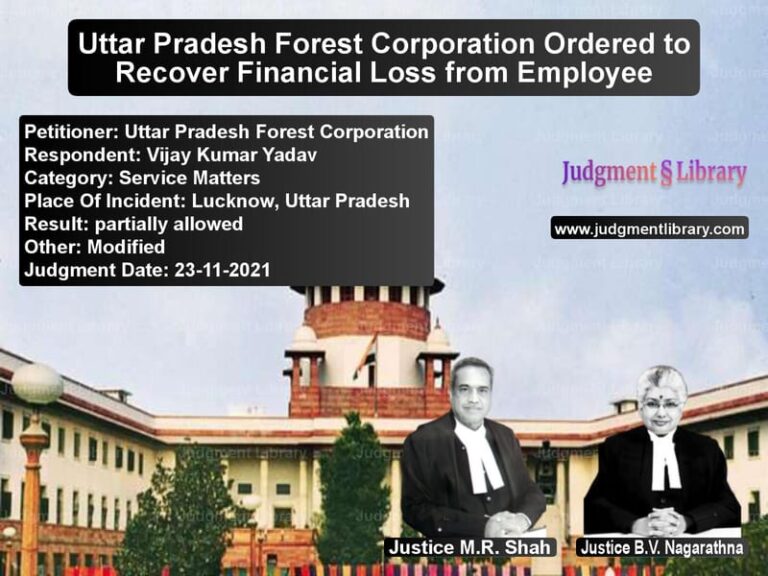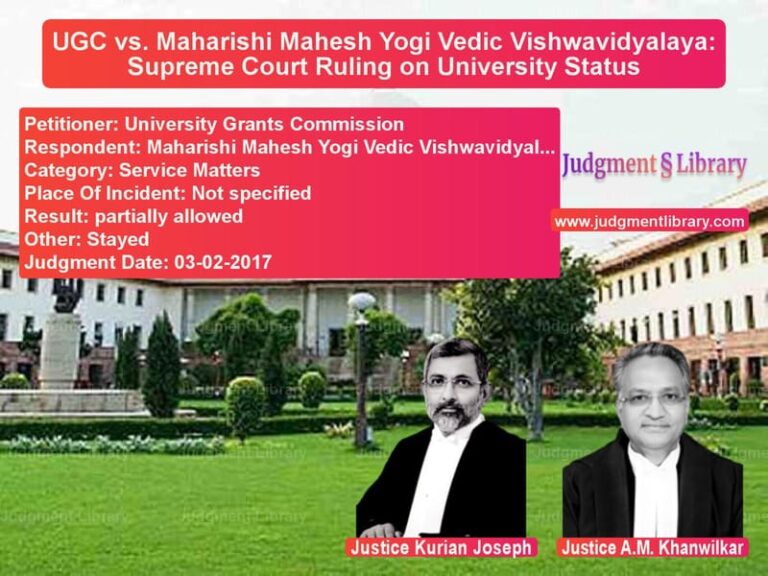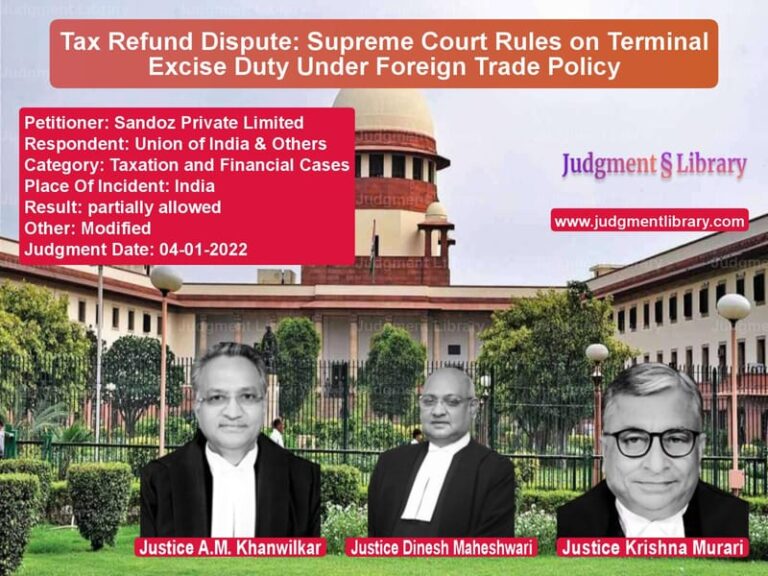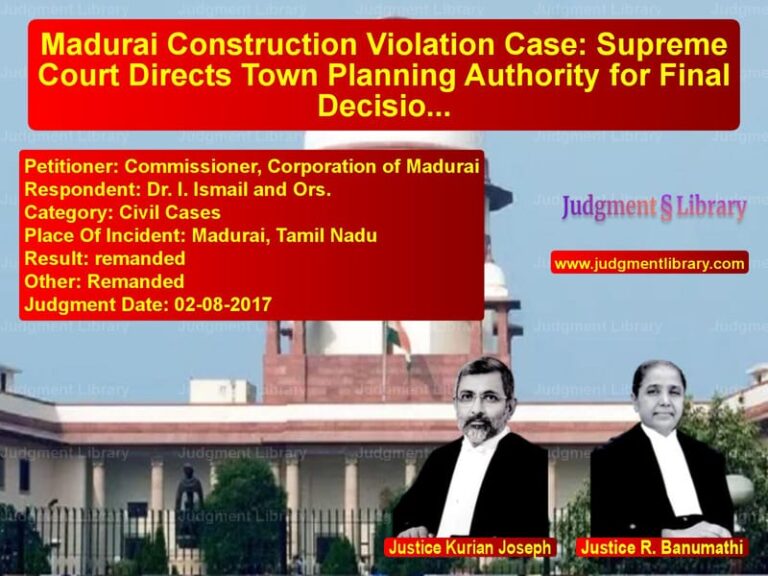Medical Admissions and Reservation: Supreme Court Rules on MBBS Seat Allocation in Madhya Pradesh
The Supreme Court of India recently ruled on a crucial case regarding MBBS admissions under the Government School (GS) quota in Madhya Pradesh. The case of Ramnaresh @ Rinku Kushwah & Others vs. State of Madhya Pradesh & Others examined whether meritorious reserved category candidates who studied in government schools should be considered under the unreserved category before seats are transferred to the open category.
The ruling is significant as it reaffirms the principle that reservation policies should not result in meritorious candidates being denied admission while less qualified candidates secure seats under the open category. The Supreme Court’s decision corrects an erroneous application of reservation policies in medical admissions.
Background of the Case
The dispute arose after the Madhya Pradesh government introduced a Government School (GS) quota for MBBS admissions in 2023, reserving 5% of total seats for students who had completed their schooling in government institutions.
However, during the seat allocation process, the authorities sub-classified GS quota seats into categories such as:
- Unreserved GS (UR-GS)
- OBC GS (OBC-GS)
- SC GS (SC-GS)
- ST GS (ST-GS)
- EWS GS (EWS-GS)
The issue arose when meritorious reserved category candidates (SC/ST/OBC) who had scored high marks in NEET 2023 were denied admission under the UR-GS category, despite being more qualified than candidates who secured much lower marks. Instead of allocating these seats to meritorious reserved candidates, the authorities transferred 77 unfilled UR-GS seats to the open category.
The affected candidates challenged this process before the Madhya Pradesh High Court, which dismissed their petitions, prompting an appeal before the Supreme Court.
Legal Issues Considered
The Supreme Court examined the following key issues:
- Whether horizontal reservation under the GS quota should be applied in a manner that prevents meritorious reserved category students from securing UR-GS seats.
- Whether the state was justified in sub-classifying the GS quota, effectively preventing merit-based selection.
- Whether the authorities’ action violated the Saurav Yadav vs. State of Uttar Pradesh precedent, which held that reserved category candidates should be considered under the general category if they qualify on merit.
Arguments by the Appellants (Students)
The petitioners, represented by Senior Advocate Shri K. Parameshwar, argued that:
- The classification of GS quota seats into UR-GS, SC-GS, ST-GS, OBC-GS, and EWS-GS was illegal and contrary to previous Supreme Court rulings.
- The authorities wrongly prevented reserved category candidates from securing UR-GS seats, even when their scores were higher than candidates admitted under that category.
- The process led to an anomaly where less meritorious students (who scored as low as 214, 150 marks) were admitted under the UR-GS category, while more qualified candidates (who scored as high as 465, 428, 314 marks) were denied seats.
- The state’s action violated the Supreme Court’s ruling in Saurav Yadav vs. State of Uttar Pradesh, which mandates that reserved category candidates must be considered for general category seats if they qualify on merit.
- Since the admission process for 2023-24 had already concluded, they should be accommodated in the 2024-25 academic session.
Arguments by the Respondents (State of Madhya Pradesh)
The Madhya Pradesh government, represented by Additional Advocate General Shri Nachiketa Joshi, argued that:
- Since GS quota was a horizontal reservation, the state was justified in sub-classifying it into separate reserved categories.
- Allowing reserved category candidates to compete in UR-GS seats would disrupt the reservation system.
- Once seats were unfilled, they had to be transferred to the open category following standard admission rules.
Supreme Court’s Observations
The Supreme Court strongly criticized the state’s methodology and reaffirmed key legal principles regarding reservation:
1. Meritorious Reserved Category Candidates Must Be Considered for General Seats
The Court emphasized the ruling in Saurav Yadav vs. State of Uttar Pradesh (2021), which states:
“Candidates belonging to SC/ST/OBC categories who qualify on merit should be considered under the general category first before being placed under the reserved category.”
2. Horizontal Reservation Cannot Override Merit
The Court reiterated that horizontal reservation must be applied fairly and should not result in more qualified candidates being denied admission while less qualified candidates secure seats. It cited R.K. Sabharwal vs. State of Punjab and Indra Sawhney vs. Union of India in support of this principle.
3. Unjustified Sub-Classification of GS Quota
The Court found that the Madhya Pradesh government’s decision to divide GS quota seats into multiple reserved categories was legally unsound. It held:
“The methodology adopted by the respondents in compartmentalizing the different categories in the horizontal reservation and restricting the migration of the meritorious reserved category candidates to the unreserved seats is totally unsustainable.”
Final Judgment
The Supreme Court ruled in favor of the appellants and issued the following orders:
- The appeals were allowed.
- The judgments of the Madhya Pradesh High Court were quashed and set aside.
- The state was directed to admit the affected students in the 2024-25 academic session under the UR-GS category.
- Seven seats that had been kept vacant under an interim order were to be allocated to the appellants.
Implications of the Judgment
This ruling has significant implications for medical admissions and reservation policies in India:
- Prevents Misapplication of Reservation Policies: The decision ensures that meritorious reserved category candidates are not unfairly denied general category seats.
- Reinforces the Saurav Yadav Precedent: Strengthens the principle that horizontal reservation must not exclude qualified candidates from general category seats.
- Guidelines for Future Admissions: States must ensure that reservation policies are applied in a manner that prioritizes merit and prevents injustice.
- Accommodates Affected Students: The court’s decision provides relief to students who were unfairly denied admission.
The Supreme Court’s ruling in Ramnaresh @ Rinku Kushwah & Others vs. State of Madhya Pradesh is a landmark judgment that upholds fairness in medical admissions. It ensures that government policies do not disadvantage meritorious students and that reservation is implemented in accordance with constitutional principles.
Petitioner Name: Ramnaresh @ Rinku Kushwah & Others.Respondent Name: State of Madhya Pradesh & Others.Judgment By: Justice B.R. Gavai, Justice K.V. Viswanathan.Place Of Incident: Madhya Pradesh.Judgment Date: 19-08-2024.
Don’t miss out on the full details! Download the complete judgment in PDF format below and gain valuable insights instantly!
Download Judgment: ramnaresh-@-rinku-ku-vs-state-of-madhya-prad-supreme-court-of-india-judgment-dated-19-08-2024.pdf
Directly Download Judgment: Directly download this Judgment
See all petitions in Fundamental Rights
See all petitions in Public Interest Litigation
See all petitions in Recruitment Policies
See all petitions in Judgment by B R Gavai
See all petitions in Judgment by K.V. Viswanathan
See all petitions in allowed
See all petitions in Quashed
See all petitions in supreme court of India judgments August 2024
See all petitions in 2024 judgments
See all posts in Constitutional Cases Category
See all allowed petitions in Constitutional Cases Category
See all Dismissed petitions in Constitutional Cases Category
See all partially allowed petitions in Constitutional Cases Category

